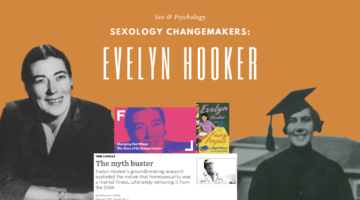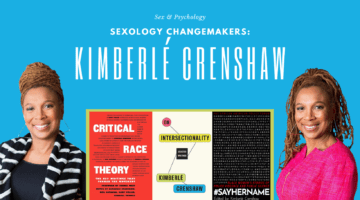Tips For ‘Cheat-Proofing’ Your Relationship
July 18, 2022 by Justin Lehmiller
Most people say that their ideal relationship would be monogamous. Despite this, however, a lot of people seem to have a really hard time maintaining monogamy. So if monogamy is what you want, what do you need to know? Are there any strategies you can try to help “cheat-proof” your relationship?
I recently interviewed Dr. Lucia O’Sullivan for the Sex and Psychology Podcast. Lucia is a Professor of Psychology at the University of New Brunswick. She has published over 100 peer-reviewed articles on sexual and romantic relationships and is an Associate Editor of the Journal of Sex Research.
Below is an excerpt from our conversation (you can listen to it in full in this podcast) in which we talk all about what monogamy is, how it can look different for different people/relationships, and how outside crushes can go from innocent to threatening. Note that this transcript has been lightly edited for clarity.
Justin Lehmiller: A lot of people seem to enter relationships with the assumption that, by virtue of being in a relationship, it’s necessarily going to be monogamous. And in many ways, I can understand this because if I think back to my own early relationships in my life before I became a sex researcher and ever started thinking about this stuff, that’s certainly how I approached things. I didn’t recognize at that point in my life that there were other relationship models and things that you needed to discuss and establish.
So, tell us a little bit about why assumed monogamy is problematic and how that can set the stage for relationship problems later on.
Lucia O’Sullivan: This is where I’ve been really wallowing lately because we started with the premise that people are surrounded by attractive others. You may be in a committed relationship. You may even have some spoken or unspoken agreement to be exclusive, but you’re spending most of your waking hours away from your partner, typically. And that means you are constantly in a sense, having to negotiate attraction. Think of attraction as a magnet. Sometimes you’re just going to be drawn towards someone, like it or not.
How do you manage that when you really do have a goal of maintaining exclusivity? We wanted to know how people in committed relationships handle their exposure, essentially, to attractive others. We found that there are three primary strategies that people who are successful at monogamy seem to engage in.
The first is that they really focus on their partner. They sort of think, ‘oh, my partner is so wonderful, and this is why they are,’ and they set up couple-time, and they really reinvest in the relationship.
Another strategy that’s very successful is that they focus on the attractive other and find things about them that are really kind of obnoxious or negative in some way. ‘Oh, you know, the shape of their fingertips are square, I hate that,’ or ‘they have that weird way of drooling saliva out of the corner of their mouth.‘ It could be anything at all, but it’s about focusing on and exaggerating some negative aspect.
Then the third, which is probably the strategy that most people are thinking of when they think of how we self-correct, is to chastise oneself—to make oneself feel guilty and really think about what disaster would follow if you were really drawn to this person, or you had some kind of connection with them, sexual, romantic, or a combination, and all that you would lose. We do find that the people who use these strategies, particularly if they use them frequently, are more likely to stay the course.
I suppose this is a good place to add that it’s hard to do that. And that’s actually where our crush research comes in. A lot of people love the idea of finding people attractive other than their partner. They like to enjoy that their personal trainer is gorgeous, or the guy at the coffee shop who remembers your name and exactly what you like, or whatever the case may be. Having these people in our lives gives us a little spark, a reason to make a little more effort, or just a nice little flirty exchange that adds a little color or fun. And for the most part, they are harmless…until they’re not, and that’s where things start to tumble. That attraction to another person can be super harmless and fun and entertaining–a source for our fantasies, even–for people who want to maintain monogamy. But there are conditions where things can go very wrong.
Justin Lehmiller: So you mentioned some of the strategies that work for maintaining monogamy, but they’re difficult and not everybody does them.
What are some of the strategies people do that don’t work? What are the ineffective strategies for maintaining monogamy?
Lucia O’Sullivan: Definitely spending time with that attractive other. We think of it as a ‘trip wire’ to infidelity. So, people who are successful are able to maintain that distance, and people who are not get ever drawn into the chemistry of that attraction. And I think it boils down to that.
And I know you may think, well, of course, that makes sense. But when we have these attractions and they are used for fun or entertainment and we’re maybe reluctant to give them up, we often, I think, deny that they are posing any kind of problem to the quality of a primary relationship, and it can lead to devaluing of the primary relationships.
So unsuccessful strategies include primarily spending time together [with that attractive other] and finding a way to spend time together, but also communicating your attraction to that other person. It’s one thing to have a crush from afar, but it’s quite another to actually communicate it. Because to communicate it to that person is opening that door–that’s another trip wire. So, it’s possible at that point to find out–and maybe that’s the goal–to see if they also find you attractive. And then once that’s explicit in some form, things can accelerate in a way that you may not have meant.
And the trick, I think, for people who are prone to straying, when they don’t want to stray, is to recognize a couple of steps before, where they need to back off before they get emotionally or otherwise entangled.
Justin Lehmiller: It’s interesting when you were talking about spending time with that attractive other, I’m also thinking, since we’re both social psychologists, about the social comparison effect. When you’re with this person who’s new and you’ve got that very intense, magnetic attraction to that other person, but you’ve been with your primary partner for a really long time, and the passion has sort of dwindled. But you’re feeling this really intense passion for this other person and attraction to them. And your long-term partner may have all these things they do that now annoy you–things that weren’t annoying in the beginning of the relationship, but have became annoying over time. Like the way that person chews or snores, for example.
So then there becomes this contrast effect where you feel this really intense passion for the other person and they don’t do these things that annoy you. That can further push you toward exiting the relationship or committing infidelity because the grass seems greener elsewhere.
I think it’s really important to have that reality check–to recognize that if you leave this relationship and start a new relationship with someone else, eventually all of those same problems are going to emerge again. The passion is eventually going to die down to some degree. That new person is ultimately going to do things that annoy you.
I think we have a tendency to not think about those things in the moment because we get so consumed and caught up in those passionate feelings.
Lucia O’Sullivan: Right. I have this theory, and I really should test it, but I think a key component of this issue that you just brought up is also the secrecy. A great misattribution of arousal. But secrets, of course, stress us out. If you’re trying to keep something on the down-low, people often confuse the stress of keeping something secret with passion, because it all feels the same.
It’s all stomach clenching, heart racing, blood pressure zooming—all the factors are exactly the same emotional response. But often you read about where people have a relationship on the down-low in some form, once it’s exposed, they are a little surprised about how it loses some of its shine.
And that’s exactly the point that you have just brought up, which is how it’s easy to find someone new, the novelty and the excitement around someone new. And it does create that stark contrast to the old, the tried, the true, because you know what to expect. It’s easy to habituate to someone unless you work hard to keep it fresh.
Justin Lehmiller: When we’re talking about secrecy in the context of a crush or in the context of infidelity, I think you’re right. That secrecy can potentially amplify the intensity and excitement because maybe there’s that misattribution of arousal or this excitation transfer because you’re kind of already in that heightened state of arousal. So that amplifies the other feelings and emotions that you have in that moment.
And there is a set of studies conducted by Dan Wegner at Harvard. I think this was in the eighties or nineties where he had college student participants come in and they played secret footsie with one another in a lab. These were male and female heterosexual pairs, and they were sitting on opposite sides of the table. Some of them were told to play footsie and some of them were told to play footsie and keep it secret.
And what they found was that the ones who had to play secret footsie were more intensely attracted to their lab partner, which I think supports this idea that secrecy can sort of fuel that excitement in some of these limited contexts. But it’s a very different thing when you’re in a long-term relationship and you’re hiding that from your family and friends and so forth.
So, let me ask you this, based on your research in this area, do you think that there are any concrete tips or takeaways that people can use to try and ‘cheat proof’ their relationship to some degree?
I don’t think anyone can ever guarantee that infidelity will never arise because we never know what the future is going to be. But what would be your top tips or takeaways about what you can do to reduce the risk of infidelity in a relationship?
Lucia O’Sullivan: I think there would be three top tips.
First is you talk to your partner about what they consider the boundaries to be. So, if you have a partner who’s fine if you made out drunkenly at a party and that’s no big deal, great. But if you have a partner who would be hugely offended and feel like you have misbehaved if you even masturbated to porn, that’s something else. So, figuring out where your overlap is–that’s good for boundaries.
I think the second is to be honest with ourselves about our attractions to others– that the rules for ourselves and what we hold for our partners are often different. And that if it’s not okay for your partner, it shouldn’t ideally be okay for you either. So that’s important.
Then I think a third one is to kind of just chill out about the whole thing because part of the problem is we make even very minor violations of exclusivity to be such a deal-breaker. Attraction [to others] doesn’t get switched off just because you’re in a relationship.
So, I think it’s important to acknowledge that your whole life long, you’re going to find the people who want you to be attractive and possibly find some of those people, even, to be a potentially better partner than yours. But it’s recognizing the points you made earlier about all you’ve invested in your relationship: your time, your interests, all the things you’ve done, your networks, and so on. Even taking into account the eventual costs of the short-term rewards–you know, the annoying habits that will develop. That new relationship–if you’re going to jump ship–is going to look very similar after that 6- to 12-month window of passion passes, and think of all you can lose in that process.
I think those are the top three tips for getting this right.
Justin Lehmiller: I think those are all great and really helpful. And we would all benefit no matter what our relationship structure or orientation is, or what we want from our romantic lives, we would all do better to communicate more about these rules and boundaries and what fidelity means to your partner, and what monogamy or exclusivity mean.
Listen to my full conversation with Lucia in this podcast.
Want to learn more about Sex and Psychology? Click here for more from the blog or here to listen to the podcast. Follow Sex and Psychology on Facebook, Twitter (@JustinLehmiller), or Reddit to receive updates. You can also follow Dr. Lehmiller on YouTube and Instagram.
Image Source: Photo by Markus Spiske on Unsplash

Dr. Justin Lehmiller
Founder & Owner of Sex and PsychologyDr. Justin Lehmiller is a social psychologist and Research Fellow at The Kinsey Institute. He runs the Sex and Psychology blog and podcast and is author of the popular book Tell Me What You Want. Dr. Lehmiller is an award-winning educator, and a prolific researcher who has published more than 50 academic works.
Read full bio >


